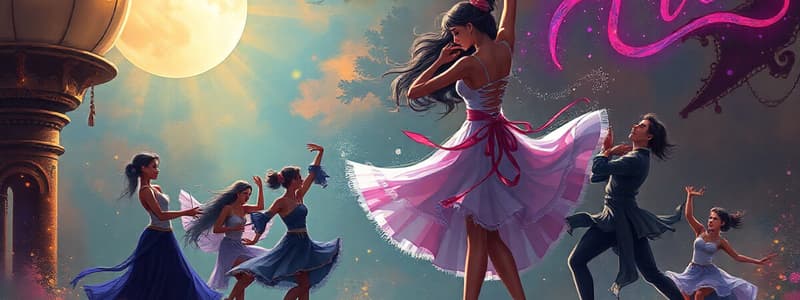Podcast
Questions and Answers
What is the general definition of dance?
What is the general definition of dance?
It is the act of composing steps with grace, precision and facility to the time and beat of music using the body as its medium or tool.
Dance needs a common race for communication.
Dance needs a common race for communication.
False (B)
Which of the following is NOT one of the five major elements of dance?
Which of the following is NOT one of the five major elements of dance?
- Space
- Shape (correct)
- Actions
- Dynamics
What are loco-motor movements?
What are loco-motor movements?
What does 'dynamics' refer to in dance?
What does 'dynamics' refer to in dance?
Participation in dance promotes motor skill development and increases __________ understanding.
Participation in dance promotes motor skill development and increases __________ understanding.
According to Kassing (2007), what is dance?
According to Kassing (2007), what is dance?
All dance forms are permanent, definitive, and ultimate.
All dance forms are permanent, definitive, and ultimate.
What does 'relationship' refer to in the context of the elements of dance?
What does 'relationship' refer to in the context of the elements of dance?
Flashcards are hidden until you start studying
Study Notes
Dance Defined
- Dance is a performance art that involves rhythmic movements of the body, often accompanied by music.
- Dance is a universal language that transcends cultural boundaries and has been used to tell stories and express emotions for thousands of years.
Origins and History
- Dance originated in ancient rituals and ceremonies.
- Modern dance forms evolved from historical, traditional, and ethnic dances.
- Dance reflects the history, culture, and beliefs of different societies.
Elements of Dance
- The elements of dance are the key components that make up any dance form.
- Five essential elements:
- Actions: The movements that the body makes, including locomotion (moving around) and non-locomotion (staying in place).
- Body: The instrument of dance, including the dancer's posture, alignment, and control.
- Relationship: The connection between dancers, dancers and objects, or parts of the dancer's body.
- Dynamics: The qualities of movement, such as energy, force, and weight.
- Space: The area in which the dance takes place.
- Body movements can be categorized as:
- Loco-motor: Movements that propel the dancer around an area.
- Non-loco-motor: Movements that are performed in place.
- Manipulative Skills: Movements that involve the hands or feet handling equipment.
Factors Affecting Performance
- Psychological factors, such as fear and anxiety, can impact movement and performance.
- Physiological factors, such as fitness and strength, are crucial for executing dance movements effectively.
Studying That Suits You
Use AI to generate personalized quizzes and flashcards to suit your learning preferences.




